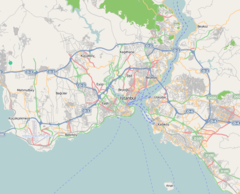Pangaltı Catholic Cemetery

An angel from the cemetery during a snowstorm in 2005
|
|
| Details | |
|---|---|
| Established | 1863 |
| Location | Feriköy, Şişli, Istanbul |
| Country | Turkey |
| Coordinates | 41°03′12″N 28°59′07″E / 41.05330°N 28.98528°ECoordinates: 41°03′12″N 28°59′07″E / 41.05330°N 28.98528°E |
| Type | Catholic cemetery |
| Style | 19th century European |
Pangaltı Roman Catholic Cemetery (Turkish: Pangaltı Fransız Latin Katolik Mezarlığı), also known as Feriköy Latin Catholic Cemetery, is a historic Christian cemetery in Istanbul, Turkey. It is the largest Catholic cemetery in Istanbul. The cemetery is at Feriköy neighborhood in Şişli district of Istanbul, nearly 3 km (1.9 mi) north of Taksim Square. The main Protestant burial ground of the city; Feriköy Protestant Cemetery, Istanbul lies just across the Catholic cemetery. Two neighboring cemeteries are divided by a road; Abide-i Hürriyet avenue.
The origins of the cemetery date back to 1853, when the Ottoman government declared that the graveyard of the Franks at Pera was no longer suitable as a burial ground. A new site was granted near the Imperial War Academy in Pangaltı as a cemetery for Istanbul's Protestant and Catholic communities. This initiative aimed at clearing ground for urban development in the Taksim area. Four years later, the allotted space was deemed insufficient for the dead of both communities, and a second grant - issued by order of Sultan Abdülmecid I in 1857.
Between 1840 and 1910, the area of Istanbul stretching northward from Taksim to Şişli was transformed from open countryside to densely inhabited residential settlement. Early 19th century maps of Istanbul show much of the area in this direction taken up by the non-Muslim burial grounds of the Grand Champs des Morts, with the Frankish section directly in the path of the main route of expansion, including the widening of the main road running from Taksim to Pangaltı. Due to this reason, the human remains were exhumed from the old Frankish burial ground in the Grand Champs des Morts and they were transferred, along with their grave markers, to its current location in 1863-1864 in Feriköy - created by order of Sultan Abdülmecid I in the 1850s - for re-interment.
...
Wikipedia

